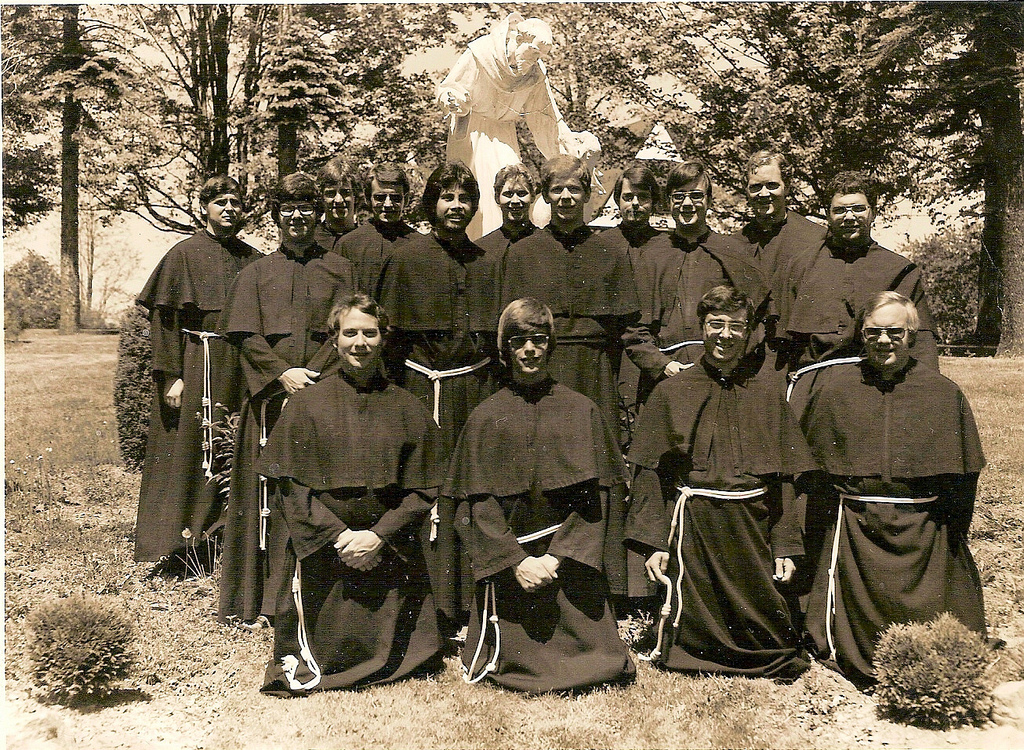Priesthood or Married Life? Consecrated Single Life or Religious Life? Diocesan Priesthood or Religious Priesthood? Religious Life or Married Life?
Pick one! Quick!
This could be the most difficult and important question you answer in your entire life! Are you stressed out yet?
[See also: Quiz: Which Religious Order Best Fits Your Personality?]
[See also: 3 Beautiful Celebrities Who Gave It All Up to Become Nuns]
Yes, it’s important. But are you making it harder on yourself than it needs to be? You can calm down now, because the answer is probably yes.
One of the most tumultuous and difficult things for young Catholics to speak and think about is vocational discernment. This is a deeply personal issue for each individual, but there are some general truths that seem to apply in every particular case.
I’d like to share with you some things I’ve learned (in spite of myself!) over a number of years from much self-inflicted pain and anxiety on this topic that have finally led me to the Freedom that Christ earned for me.
1) God Loves You and Wills Your Happiness. Period, Full Stop. No Matter What You Decide. Always.

Discernment is about opening yourself up to realizing God’s Will for your life.
What is God’s Will for you? I can tell you if you want.
Ready?
The Will of Almighty God for your life is for you to be happy.
That’s it.
But what is happiness? The Angelic Doctor, St. Thomas Aquinas, answers thusly:
I answer that, It is impossible for any created good to constitute man’s happiness.
For happiness is the perfect good, which lulls the appetite altogether; else it would not be the last end, if something yet remained to be desired. Now the object of the will, i.e. of man’s appetite, is the universal good; just as the object of the intellect is the universal true. Hence it is evident that naught can lull man’s will, save the universal good. This is to be found, not in any creature, but in God alone; because every creature has goodness by participation.
Wherefore God alone can satisfy the will of man, according to the words of Psalm 102:5: “Who satisfieth thy desire with good things.” Therefore God alone constitutes man’s happiness. (Summa Theologiae, Prima Secundae, Q.2, A.8, C.)
Life with God and in God is happiness. If that sounds sterile and abstract, it isn’t. The Father wants to provide the fulfillment of every desire and perfectly integrate every emotion and passion that you have into the Love that He has for you. Therefore, since the general will of God for your life is happiness and complete fulfillment in Him, does it make sense that He would ask you to do something that fails to accomplish this?
This doesn’t mean that when you’re doing the particular thing that God has willed for your life that it will be rainbows and butterflies and you’ll experience an emotional high the entire time. Quite the contrary, but God’s ability to make you happy can pierce through every form of suffering and pain that you will inevitably experience in this life. For more on that, I strongly recommend that you check out Bishop-Elect Robert Barron’s Powerful Meditation on Christ Crucified, The Happy Man.
This means you should consider two things:
a) Can you see yourself as happy doing the thing you’re considering as God’s Will for you?
This is actually a very important part of authentic discernment. This is not the only element, but it is a very important one and is the one most likely to be missed by us in our rationalistic culture. If you imagine yourself gritting your teeth and white-knuckling it through whatever you’re considering, the odds are that you will neither be able to accomplish that feat nor please God in doing so.
b) All of the above is true no matter what decision you make about your vocation.
You don’t get to decide whether or not God loves you. He’s made that call already and his judgment upon you is love and mercy. Our pride tempts us to burden ourselves with the duty of earning God’s love by making the right decision about vocation.
This is an impossible burden for anyone to carry. Relax. God loved you before, during, and after you made whatever decision you will have made, and He is powerful enough to realize your happiness in serving Him no matter what.
2) A Time Will Come In Your Discernment When You Must Act

This is something that young Catholics who have the world in front of them need to remember. There is a time when the thought of pursuing one vocation or another enters our minds and is the object of our mental consideration. This is when you think something like:
“Maybe I want to be a Priest.” “Maybe I should be a Religious Sister.” “I think I should be Married.”
At some point, however, (and when is different for each person!) this thought must transition into action.
I’d like to offer to you a reality that is common to each of those options.
Discernment, properly speaking, for each of those options always involves a gradual series of temporary commitments that are intrinsically ordered to the concrete living out of that vocation.
For example, a man enters seminary and makes a series of temporary commitments that lead him to accept formation for the next year, culminating in the permanent commitment of Holy Orders. A woman or man enter a religious community and they take a series of temporary vows (sometimes many times!) before finally discerning that they should take final vows. A man and a woman start dating and they eventually reach a point when they are temporarily committed to each other and it is no longer acceptable (even in secular culture!) to begin other relationships without ending this one. They become engaged, a temporary commitment, before they take the final plunge of ’til death do they part. Notice the pattern here?
Now there undoubtedly many circumstances in which good people may find themselves where they must say, “I can’t even make one of those temporary commitments because of ________!” and that can be for many, many legitimate reasons. That’s totally fine, you have to ask for the grace to trust God’s providence that you are where he wants you to be right now.
However, whether or not that’s the case needs to continue to be an object of discernment for each individual. Why? Because our capacity for self-deception is great. It is very, very easy for us to deceive ourselves into believing that we are “discerning” a vocation when in reality all we are doing is mentally considering the possibility of maybe doing something one day.
Why do we do this? Because all commitment, even temporary commitment, involves an element of risk. Our generation hates risk. We are terrified of making the “wrong” choice and losing everything. Pope Benedict told us, “If we let Christ into our lives, we lose nothing, nothing, absolutely nothing of what makes life free, beautiful and great.”
But Love is a risk! Always! What do I risk by telling people that I am “discerning priesthood” for example? Pretty much nothing. What do I risk by actually going to seminary? Time, money, my heart, the opinions of others. That’s a lot!
A good litmus test is this: does my discernment involve a risk to me personally in any way? Is there a chance that this might not work out and I would experience pain? If the answer is no, what we are doing is probably less like discernment and more like thinking and talking about doing something.
So, are you a Catholic man thinking about the possibility of priesthood? Talk to your vocation director about going to seminary! Do it soon!
Are you a Catholic woman thinking about Religious life? Have you investigated good communities? Visited them? If not, why not?
Has your prayer led you to a desire for Holy Matrimony? Men, are you asking Catholic women out on dates? If not why not? Ladies, are you open to going on dates when asked?
These are just a few ideas for how you can move from the stasis of thinking about a vocation to the exciting high-stakes world of discerning a vocation.
Anything you’d like to add? Let me know in the comments!
Originally posted on The Campion
[See also: QUIZ: Can You Match These Liturgical Latin Phrases With Their Meanings?]
[See also: QUIZ: Can You Identify These Liturgical Objects?]


